A few weeks ago, I had the opportunity to sit down with Matt Rosen, a physicist at the Martinos Center, who is most recently known for his groundbreaking work involving the development of a portable “bedside” MRI scanner.
I’m going to let you down gently. If you thought you were going to learn more about Hyperfine from reading this post, I’ll have to guide you here and here.
Instead, my call with Matt began with him pulling out his sarode from Northern India, an instrument he started playing in 1994 while in graduate school. You can see him playing the sarode at his wedding in the photo below. Matt pretty fittingly described this instrument as “a cross between a banjo and a ’57 Chevy,” given its chrome fingerboard, fretless nature, and skin head like a banjo.
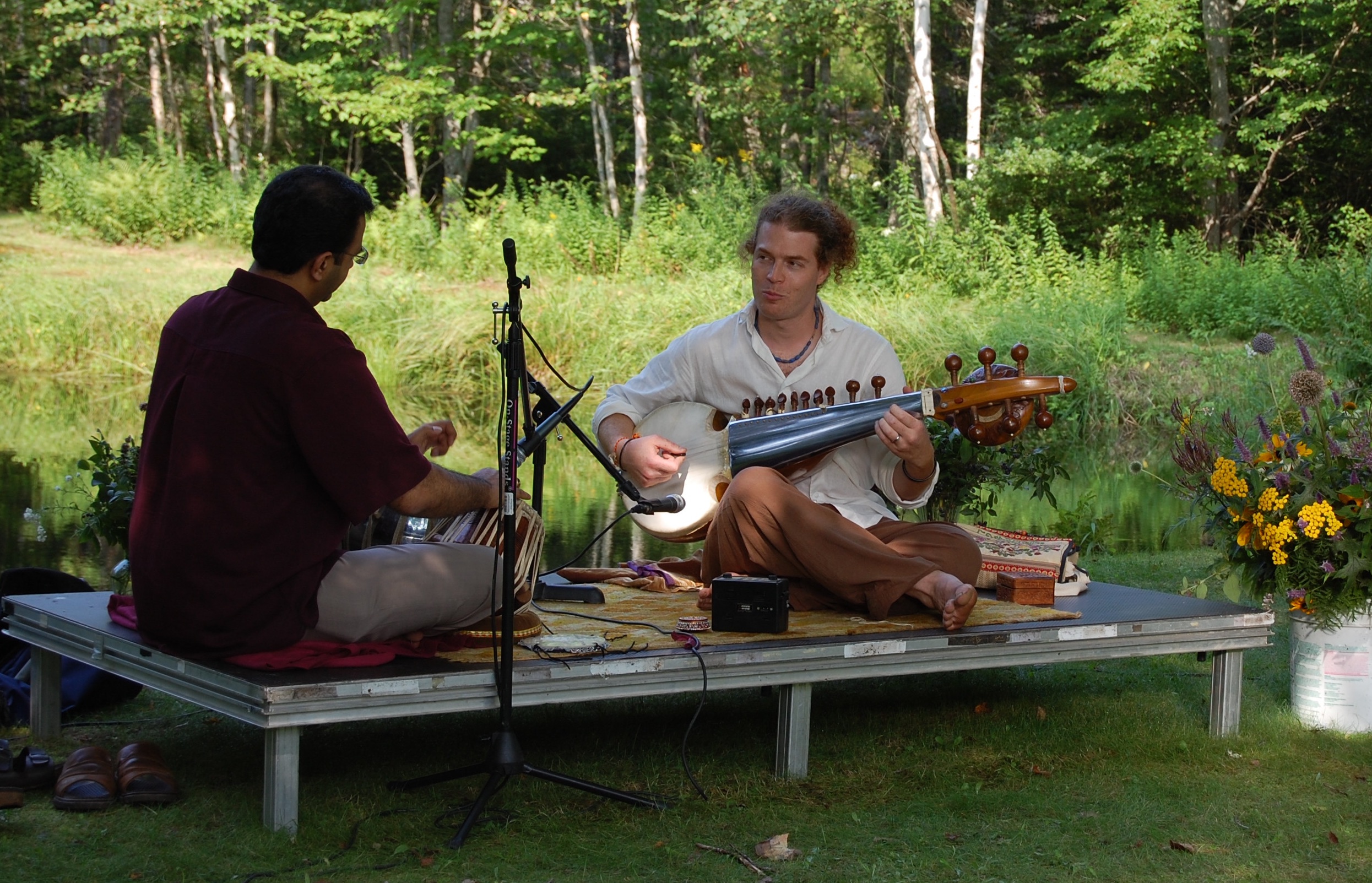
You may be asking yourself a number of questions right now. Matt learned to play the what? Are you sure you don’t mean the sitar? There are other musical instruments from India? And, I promise we’ll get your questions answered, but first, let’s go back to the beginning.
Here’s a picture of Matt playing at CBGBs in New York, way before he learned to play the sarode.
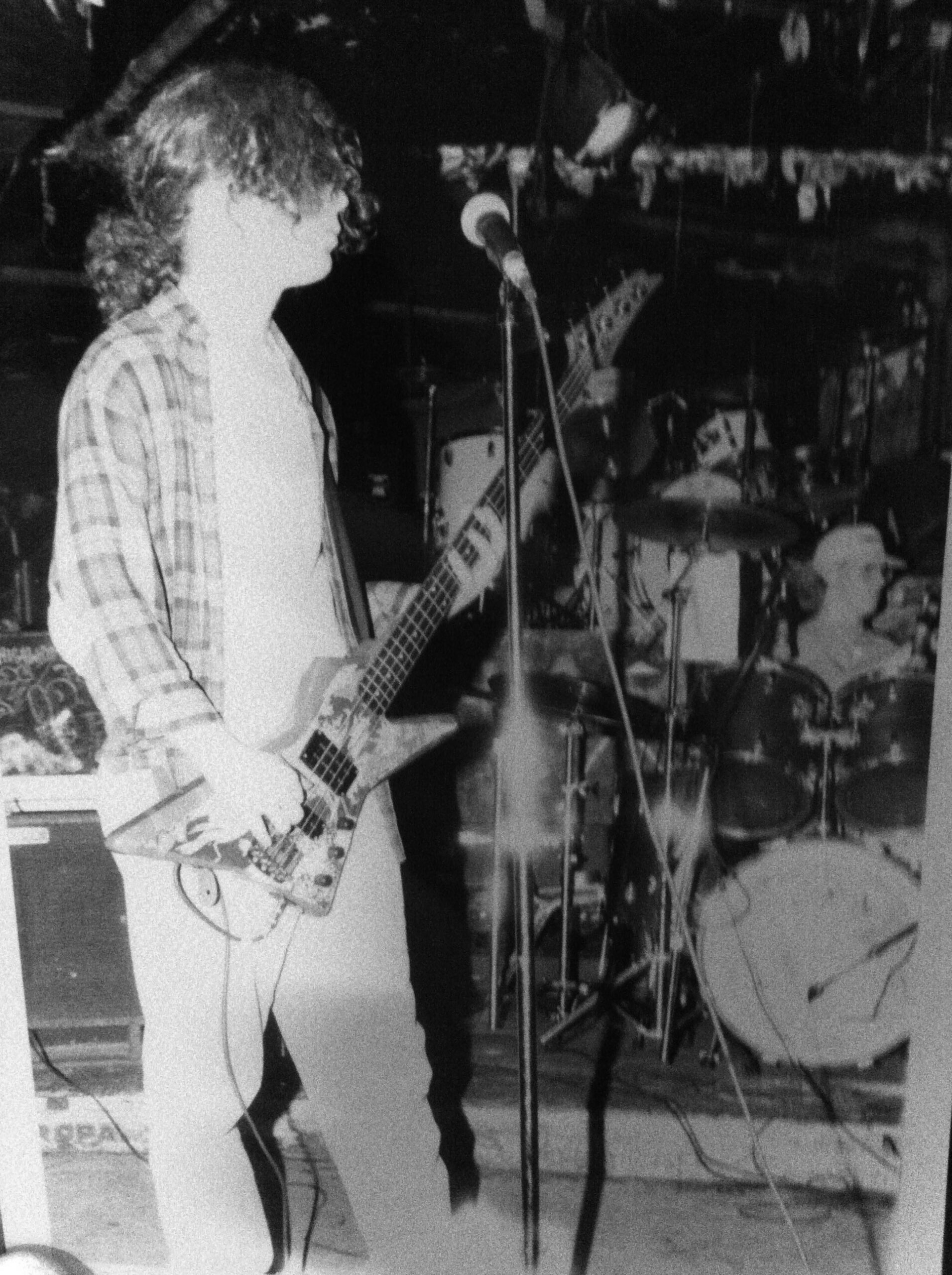
He and his band, which you will hear about more in a bit, were recording an album in Albany. His bass at the time, “a wild-looking thing” as he put it, was sort of falling apart. He knew it probably wouldn’t survive.
So, in his senior year of college, Matt spent a lot of time on the train going down to New York City, trying out different instruments on weekends, and eventually ended up with the instrument below, which is his main bass to this day.
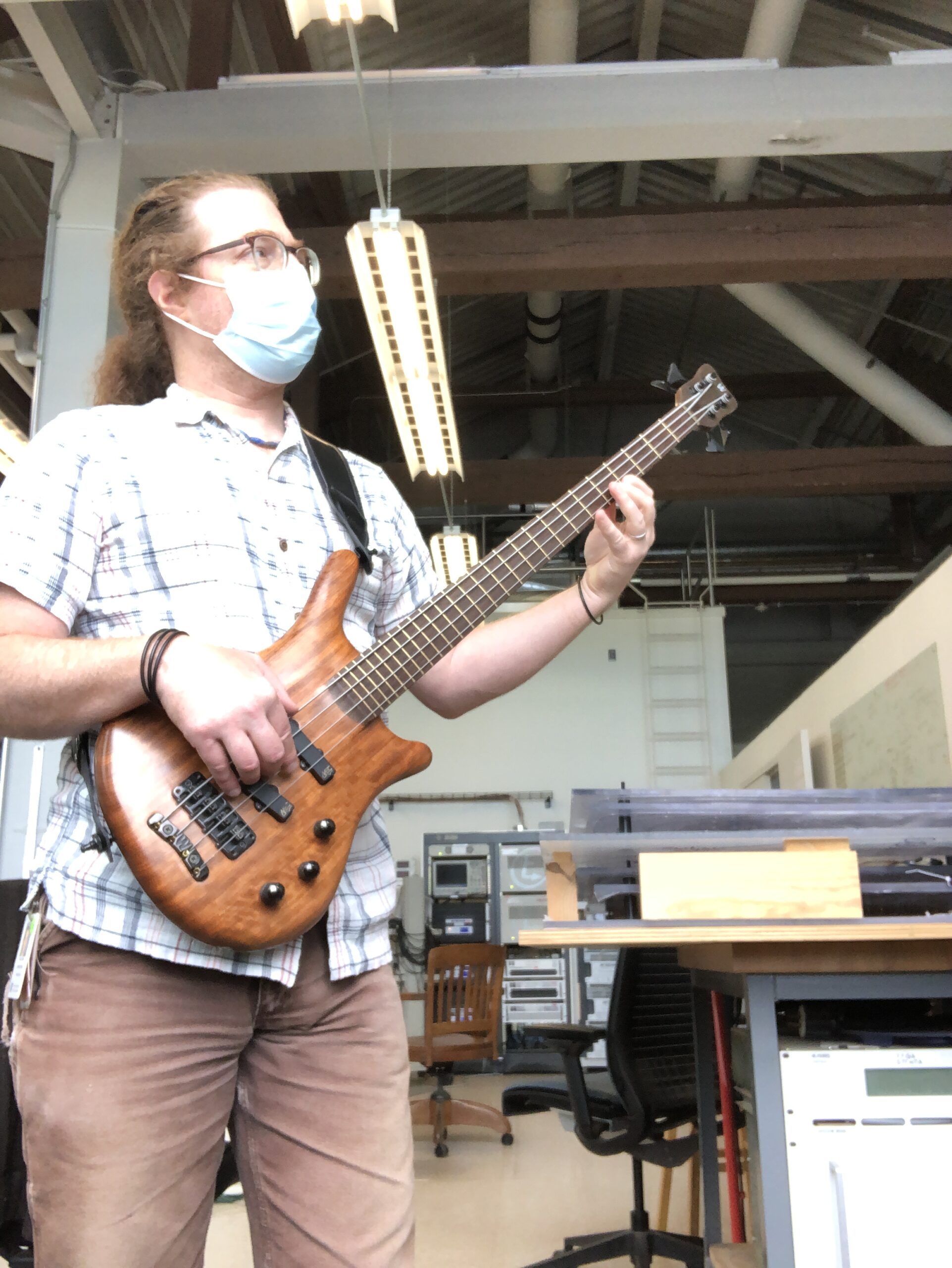
To know more about what happened in between the two pictures above, read our interview with Matt. You’ll see he is a natural storyteller…
So, where did you grow up?
I grew up in New York on Long Island in a town called Huntington. I was kicked out of public school in 5th grade. It’s a long story, maybe for another time. Eventually I ended up in an independent school from grades 7 through 12. I actually serve on the board of that school currently as it turns out, and I gave their commencement address a couple years ago. It’s called the Knox School. It is a beautiful, independent school—about 180 kids on 55 acres on the north shore of Long Island.
Were there music courses that you took there (at the Knox School)?
I did take a music theory class and the other two students in the class were in my band. (laughs) I met my band there. I had like zero musical aptitude. In fact, I don’t come from a musical family at all, like at all. My father can’t sing or do anything musical. My late mother would try to sing. She taught kindergarten, but her voice was awful. I did take violin lessons, but I smashed my violin in 3rd grade. And then for some reason, I guess like a lot of things, you know, you meet people who are your friends and who really inspire you. My guitar player, a guy named Scott, and my drummer, a guy named Ben, we just became friends. They were musicians—very accomplished musicians and I’m like “I wanna do this.” So I learned to play because of them. They were so super talented, and to this day, they are like, you know, professional level. One of them, in fact, is a professional guitar player (Scott Hull).
That is kind of like the story of my life. I don’t have a lot of talent in anything I do in the world, but I work really hard, and maybe I have a vision for things. I can kind of see like the light at the end of the tunnel (more on this later). I have a very high frustration level. I don’t get frustrated easily. And, my science is the same way.
I would just sit and practice. I’m basically self-taught. Like my guitar player would write these songs. He’d record the parts for me on a cassette tape and he would say go figure out how to play this. And I’m like “Oh my god, what the heck?” So, we just would play all the time, and we turned out to be a pretty good band.
What was the name of the band?
At that time, we were called Technical Misanthrope. I guess we renamed that band Head in the Picklejar like caught with your hand in the pickle jar, but your head in the pickle jar.
Do you play currently – do you play locally?
It’s sort of a funny trajectory. So, I learned to play the bass. I recorded with my band. We had a good time. We released a couple albums – made some money, whatever.
What do you mean? You are being very humble. People do not make money from making music. Or, most people don’t.
I paid for this bass through cassette sales – $5 a cassette. We were just very resourceful kids. Somehow we scavenged together enough money to pay for the studio time. We were all at different colleges: me, Ben, and Scott. I was at RPI (Rensselaer Polytechnic Institute) in New York, so we met in Albany to record. We somehow put enough money together to record. The engineer really liked us, so he kind of cut us a deal. Our drummer, Ben, was an undergraduate at Connecticut College and he also had a part-time job in the radio station. So, he duplicated our cassette tapes on the side until he got in trouble. I think he lost that job, and so, they would send them to me and I would sell them. We’d sell them for $ 5 bucks each. And like you know, we sold a lot of tapes. Maybe we sold like 500 tapes or something like that. I remember we used to have our cassettes at Strawberries. It was a record store in North Station in the old days. It was a chain, and yeah, we had our cassette there – kind of funny.
So the trajectory?
So, I did that stuff. Then, I went to grad school in Ann Arbor starting in 1992.
Michigan is a great place for music!
Oh yeah, it was awesome and I played in a ton of bands. So, I was playing bass for a ton of bands, and that was nice. And then, I started to have some trouble with my hands. I had sort of like RSI (repetitive strain injury) issues. And, the bass, especially the way to play, you know, it is sort of an awkward position. Both hands are in bad spot. Now people understand you shouldn’t do that, but back then people would say, “Oh, play through the pain!” I was in a bad way, so I was looking to change instruments or try something else. I was really interested in the classical music from India and in particular, northern India and in specific, an instrument called the sarode, which basically nobody even knows what the heck the sarode is.
In case you are one of those nobodys or you forgot from the beginning of the post, here is another pic of Matt with the sarode.
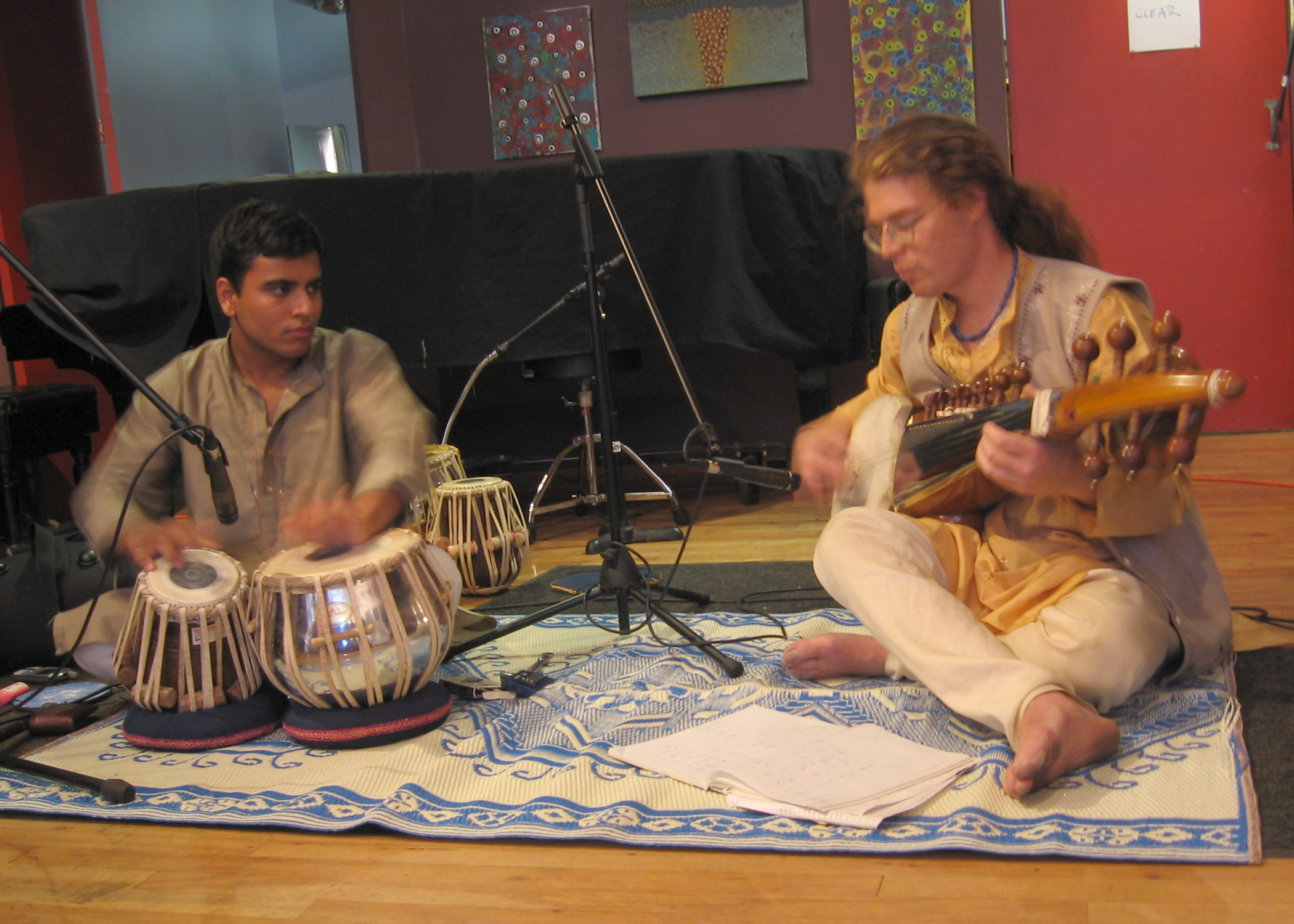
So, the sarode, it was an instrument I had never seen before. I would go, in those days, to Tower Records. I would go into the Indian classical music section. I’d look at the pictures, and there’d be a little piece of the instrument. In my mind, I was trying to put together like, “what is this instrument?” I went to live music all in the Detroit area and met a guy who has his PhD in sitar. He told me “I don’t play the sarode, but I can teach you the structure of this music and I have a sarode and I can kind of show you some techniques…Oh and there’s a guy coming from Northern India, who is a really famous sarode player and he can show you these techniques.”
So, there’s 24 year old me. I go to this guy’s house. He feeds me. It’s like all this amazing stuff I’d never seen before. This guy, his friend coming from India, turned out to be the late Pandit Buddhadev Das Gupta, who was like the senior sarode player in India. He became on the spot my teacher essentially and who had this instrument (one in the photos) built for me.
So, it was like this funny story of me like trying to deal with my RSI, picking up a whole new culture of music, meeting all of these amazing people, falling in love with this music. I kind of put the bass aside really. I was playing the sarode almost exclusively. I moved to Boston in 2001, after getting my PhD. I was at Harvard for a while in the Physics department. In 2009, I came to the Martinos Center. I was playing and I was teaching Indian music. I had become one of the senior American students of this particular style, and this particular person who taught me in India. But, in 2004, I had an accident and I cut off part of my left index finger.
Oh my gosh, how did that happen?
So, I was in the machine shop working on some art project at like one in the morning. I was a machinist before I went to college. I was tired and fooling around. I wasn’t paying attention, and I touched a cutter—a spinning cutter. It is a pretty sharp little thing. I just kind of touched it, and I was like “ah sh**!”
What kind of art were you making?
I don’t know what I was working on at the time. I make these things called poetry objects which are concrete instantiations of poems (see an example of one below). So there is a poem associated with it. There’s an object that is machined. The poem is on the object somehow, usually stamped. By manipulating, exploring, and reading it, you get other insights into it. It makes poetry really tactile. You can kind of get into other aspects of interpretation, so I was making something like that.
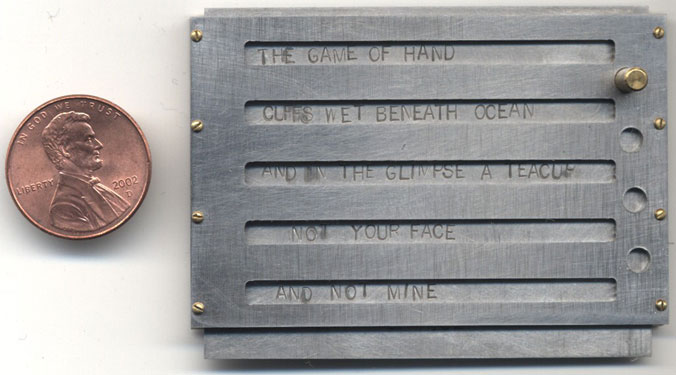
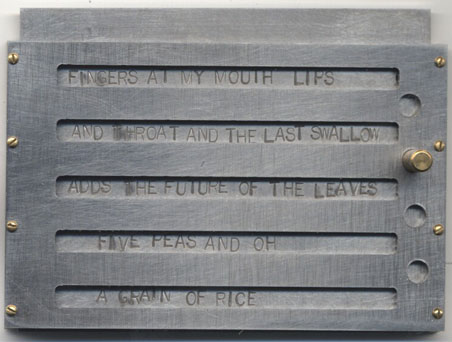
That basically ended my Indian music career because the sarod is played with the nails. So I don’t really have a nail on that finger, and I was like that’s that. And the finger kind of hurt for a long time. So, I kind of gave up playing music in 2004 – March 12th – not that I’m keeping count (laughs). It was a traumatic time for me, again before I was at the Center. Frankly, I was rather disenchanted with academia in general, and I thought I’ll open an Indian music school. I was involved with a new Indian music school actually in Waltham, and then, after I got hurt, I was like that’s that, and I kind of put it all aside.
I hadn’t picked up the bass in a long time. And then the pandemic happens. My band, we all get in touch. We’re still friends. They say we should record an album during the pandemic. I’m like, “What the h*** ? I don’t play the bass anymore?” And Scott’s like, “Well, yeah. Tough. Figure it out.” So, we had this idea to remake an album of one of our favorite bands from high school.
What was the band?
A band that no one has ever heard from Hoboken, New Jersey called, The Objects. It was 1982 or 1983. They were kind of like Regatta de Blanc, very The Police-inspired. They were college friends with one of the teachers at the school. So these 23 and 24 year old kids came to our school and we were like 13, 14, 15. All we had was this cassette (of them playing), and to this day, all we have is this cassette. So, we got this idea “let’s record the whole album.” And, I’m like, “But, I can’t play bass. I cut my finger off.”
It turns out, it’s fine. So, I picked the bass up for the first time in like 15 years. And I’m like, “Oh, it has healed up enough that it is totally fine. It doesn’t hurt at all.” So we’re recording that album, and we’ve gotten a few tracks done, and it’s great. And so, you know, we do it over the internet. Our drummer lives on a sailboat as it turns out. So, he has an electric drum set. He’ll record the drum parts, send them to our guitar player, who has got a full studio at home— this is the famous guy, Scotty Hull. Scott will put on the rough guitar part and send it back to me. I put on the bass part. I send it back to him and then he does all the other things. And then, our friend Tim Eriksen, who we were just talking about, he’s been doing the singing on it. I think we have got 3 songs done. We are slightly slowed down now because the guy who lives on the sail boat is out sailing some place in Maine.
Here’s a picture of Matt playing that same bass he bought all those years ago with cassette tape sales, but this time while recording remotely with his band during the pandemic.
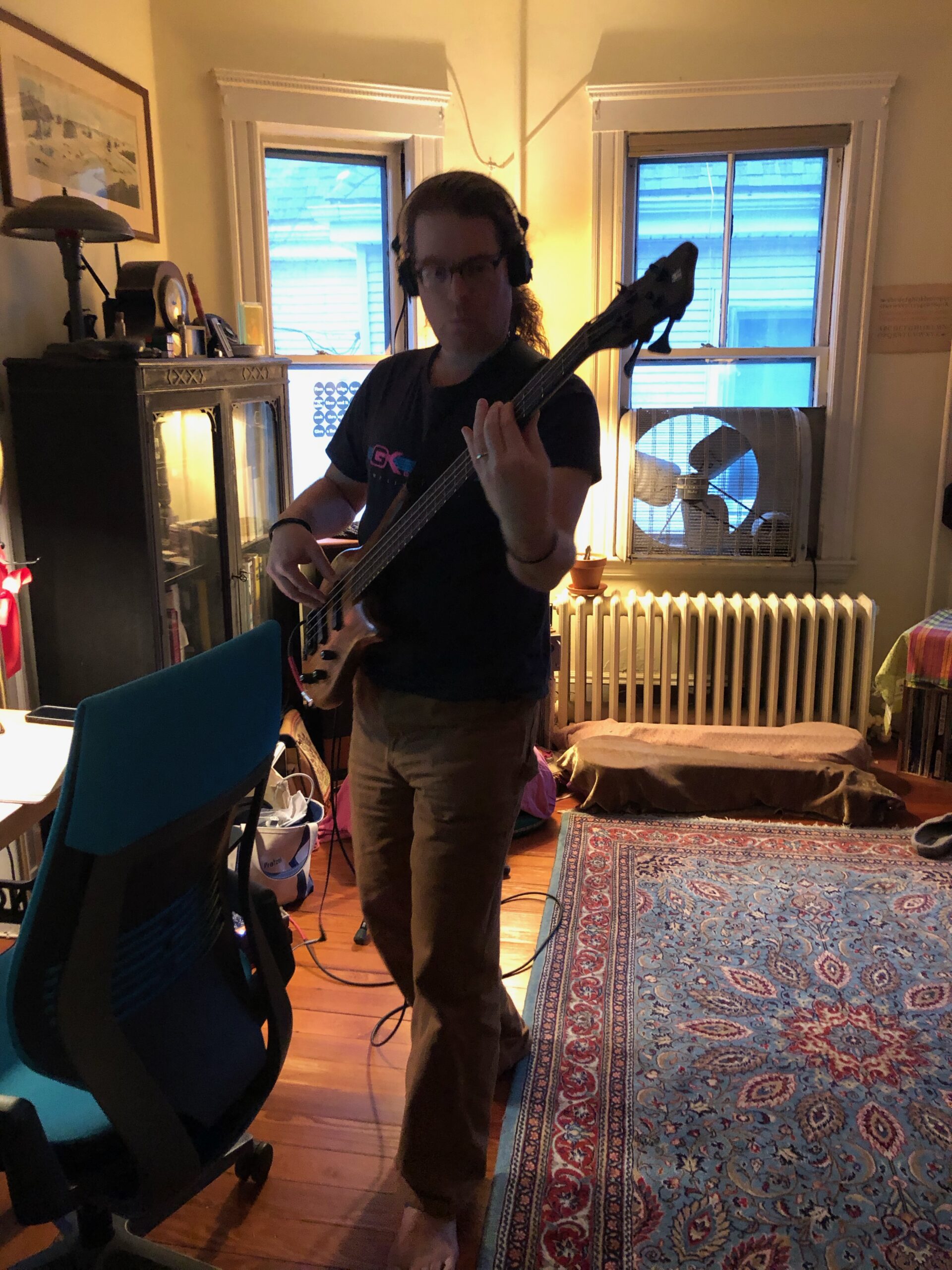
Do think you will play live like a concert or something to promote the album?
I think the plan is that we are going to do that. We’re going to release the album. We don’t own the copyright on the songs. They’re not our songs, so we’re going to donate all the money to something. I don’t know what. I have been in touch with one of the surviving band members. They’re like “Yeah, that’s cool. Wow. Ok.” They kind of vaguely remember us from a million years ago.
What genre is Head in the Picklejar?
It is just weird stuff. I would say the band is sort of a weird mixture of thrash metal and funk and I don’t know what else. We all listened to Rush, so maybe there is a lot of Rush in there. We talk a lot about fishing…and the ocean, so pretty weird (laughs).
Do you write music yourself?
I love writing. We wrote of course all our own music. I have written a bunch of songs on those albums and I continue to write music in other bands. We did have a brief stint in high school where we did cover some other people’s stuff for like a particular show where we had to do that, but like that’s not why I play music. I don’t play music to play other people’s music, except for this current project.
I do it because it is something I really enjoy. I really like the spaces in music, you know. The way you can take an idea, a musical idea, and kind of move it in time, and how that can couple with vocals.
Now, classical music from northern India is like completely improvised so it’s a different genre. In North Indian raga music, there’s a traditional framework for the piece, which is like a musical idea, like a few phrases and then you improvise around those phrases. And it’s a conversation between the instrumentalist and the percussionist. That music is all improvising all the time, which I love. And it has long been a goal of mine to put that kind of raga improvisation into punk rock or rock and roll like I’m used to playing. If you listen to the type of thoughtful improvisation that happens in the classical music of north India, each one of these performances is a whole new musical idea. So, I have been trying for 40 years to figure a way to combine those genres that is not just the average of those parts. And so we’ll see now that I have my bass connected to the computer maybe I can do something.
I love improvised music. I love improvisation in general it is one of my favorite, favorite, favorite things about giving a scientific talk in front of people. I love performing, I guess. I love improvising. I love the pressure of the moment so that all kind of leads me. That’s why I do the science I do, the music I play, ya know, the poetry I write and these objects I make.
What kind of intersection do you see between your science and art?
I always describe what I do as I’m a tool maker. I build tools using physics. It is kind of the same as making anything. It is the same for creating a poetry object. It is the same as writing a song. It is the same as doing anything that requires a set of skills – like practicing, learning how to compose, learning how to physically hit the notes. I just see that they are just really similar things.
Back when I was in grad school when I would play Indian music, people would interview me and they would be like, “Look at you! This fair-skinned fellow doing physics, playing Indian music, what’s the deal?” It seems so surprising. And my answer to those things is like everyone is surprising. There’s not so much of a difference between music and science and art and math as one might pretend there is. They are all creative spaces. They all have structure and rules and whatever, whatever. But, the greater narrative is “Oh, that pointy-headed scientist! Oh, he plays the violin? Oh my goodness, what a surprise!” We like to think these things should be different; that they should be orthogonal, but I don’t see it that way. I just see it like we are creative people—you and me. We work in different spaces. Maybe you work in ceramics, maybe you work in painting, maybe you work in neuroscience, maybe you work in computer programming. And that’s fine, it would be more surprising to me if those things were siloed rather than unified.
They are all one for you – not an intersection?
I don’t want to come across like I don’t see differences – like some fake, “enlightened” thing – it is like, “What captures your imagination?” I’m sure there are several things that capture your imagination. And so, to me, I’m very fortunate, in that I’m able to do those things—like I have the opportunities in my life somehow. Somehow it has worked out that the work I do in the lab is rewarding and creative; that the other things I do in my life are rewarding and creative. The cooking I do, the music I do; it all feels very similar, very, very similar.
So it has to do with how you communicate and interact with these interests?
I think it just comes down to you gotta meet the problems where they live. If you want to build an MRI scanner, you gotta come approach it in a certain way. If you want to communicate an emotional idea, maybe you use poetry or maybe you use music. And you need to be open to receiving. You can’t impose your will on a material that that you don’t know how to engage with. I’m not a sculptor, but if I was staring at a piece of stone…It takes certain skill to be able to make that thing express the thing you are trying to do. You can’t use what you know about soldering, or what you know about poetry.
I feel like life is a long game. It’s like you have to be able to visualize what you want to do, or where you are going. That’s way over there, like a lighthouse in the distance. And, then, along the way you interact with the materials and the things. You have to listen and learn from those things. And that process, to me, it’s the same process if I’m trying to diagnonalize some Hamiltonian in physics, if I’m trying to play some riff, or make some dal for dinner. Oh, I’m out of ginger! What can I use instead? What creative thing can I do to make the dish come out? Problem-solving? But, it sounds so analytic…
I think this direction idea is actually paramount –like dreaming. Dreaming is the key. It was a long time ago when I started thinking about how low-field MRI could enable portable MRI. A lot of people thought that was nuts. But I could see it. I don’t want to make it sound like I’m an X-man, but I could see it. Like I could see all the pieces falling into place in my mind’s eye, like these things have to happen. None of these things break the laws of physics. We’ll get there. It is just going to take me 15 years to get there.
Similarly, why would a 12 year old kid sit down and practice playing bass in his junior high school bedroom? Because I could see it. I could see playing on with buddies and playing music and people being excited.
But you’re realistic about the kind of work and effort that it is going to take to get there and you’re patient.
That’s the poetry and the prose. (Listen to the commencement address Matt gave at Knox School for more on poetry/prose.) That’s exactly right. There’s the poetry, maybe I see the vision. And there’s the prose of like I got to get down and saw this wood and pound this thing. Everything I do in my life…everything I do in my life is that way.
You see the big picture, the beauty far off in the distance…
And then it’s like, “Ok. We got to get down and grind…figure out how to get there.” That kind of bicameral mind – that, like, keeping two ideas in your mind at once is in everything I do.
Why do you play?
Music is the greatest thing. It’s communication. Playing music with my band, it’s like the greatest thing because it is just communicating with my friends and creating stuff together. It is really a special thing. I just love it. And then, yeah, similarly, the classical music from India, it was me and my percussionist. It was me and a dear friend from Ann Arbor who lives in Sudbury now. It is like hanging out and having a conversation with your dearest friends. Like we’re having a great time (in reference to us during the interview). We could have been playing music together.
I wish!
It would have been the same kind of feeling, so that’s why I do it really.
You are talking to each other…
You are talking with people who you learn to trust, so that’s a real important thing. If there are some people who you have trust in, you try other ideas, try other things. You know they’ve got your back. Music is one of those things. Yeah, it is pretty excellent.
Are you a big collaborator?
That’s again another reason I’m successful, if I’m successful at all. I’m a physicist who happens to like to do these problems in the bioimaging space. I have collaborators who are from all kinds of different things: the usual suspects like neurology, but also I have a project with Texas A&M with guys who study plants and plant roots. I love this idea of bringing other people into the room and seeing what the heck we can cook up.
Sometimes it’s like, “Wow! That’s a stinker. That didn’t work.” But, most of the time, if they’re good people, who you can trust and who can communicate, you can come up with something really interesting. You don’t know. You started here and you came out over here. And that’s all great. That’s all fun.
So, it is the process for you?
Yeah, the process, and then, at the end of the day, that the cookie comes out of the machine. If no cookie comes out of the machine at the end, then, you kind of feel like you wasted your time. But, at the end of the day, if you’re like, “Oh, delicious! We made this cool thing.” Maybe it is tomorrow, or maybe it is next week, or next year, but if there is a tangible reward, it makes it better.
How do you know if something is going to be a “stinker” ?
Pick people to work with who are good people and who know how to communicate. I don’t care if they are not the smartest person in the room, but if they can communicate that’s what matters and something good will come out. I think that is absolutely true. If you get people who are like “Argghh. No. I’m going to keep my stuff here!” (suggesting with gesture that they keep things close to the vest). Ah, life’s too short. I don’t want to deal with that.
I feel the same way about people who join my lab. I will take people with a totally different background who are enthusiastic. I’ll say, “You know what? This person is enthusiastic.” That matters more than this person who got all A’s in machine learning and deep learning. They can learn that stuff if they are motivated.
There is no better way to see that than having a young people in your lab. I have had a really good track record of bringing 16, 15, and 14 year olds in my lab for the summer. Every single one of them has been a rock star. And they can’t know anything. They are just like “I’m excited, I want to learn!” And they do. They build stuff, and they program, and they take data – and it is like, “Oh my god! If I could only collaborate with kids under the age of 18, that’d be fine!” But fortunately, there are people like this— and the Martinos Center is full of people like this. You just have to look at Bruce (Rosen) as a perfect example. He’s just open to all kinds of ideas and is generally the smartest guy in the room.
I’m not impressed by technical things. I’m impressed by communication, ability to communicate. Just like we were saying with these jam bands, where there’s maybe a lot of technical bull**** going on, but like it is unimpressive versus someone who is trying to communicate a musical idea and that you’re like “Oh, wow! That’s interesting!”
There’s a really interesting thing that happens in classical music from India, so it is really about communicating a musical idea. You’re improvising. You’re doing something. The audience is really intently listening. They interact very emotionally with the performer. So, it is the soloist and the percussionist and the audience. Sometimes it happens and they don’t hit the note. They are improvising and they kind of screw up. If this was western chamber music, this guy would be out on the street. But, in the classical northern Indian space, they are like “We got it. It’s cool. We see the idea—where that guy was going.” And it is more about the idea than the technical perfection of playing some sonata. It will happen. I’ve done it. I have seen famous, famous musicians, where they play this thing and they didn’t quite get it and they’ll try it again and the audience will “fxxxing” go crazy. So it is the same thing. If the ideas are there, the ability to communicate is there, the desire to communicate is there, we can do a couple takes, I don’t care.
If you’d like to check out more of Matt’s music, take a virtual stroll to his personal InsideOut gallery.
If you’re finding yourself inspired to share about your own artistic talents, we are always looking to meet new folks and hear about their art. Feel free to drop us a line through the Contact Form on the site. DM us on Twitter or Teams.
And that’s the latest dose of InsideOut. Until next time, be well!
Contributed by: Natalie Gilmore


